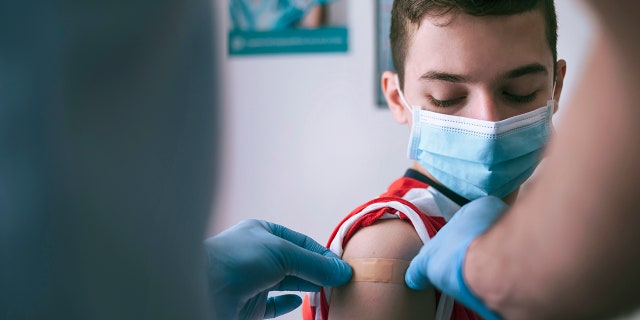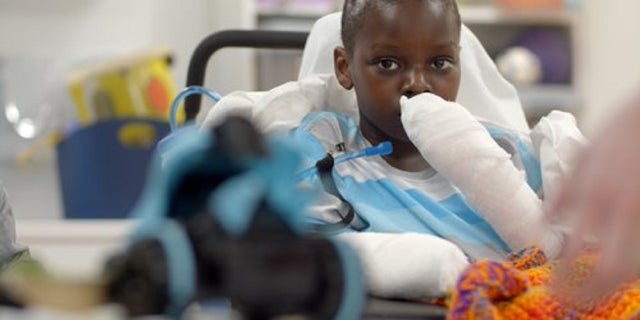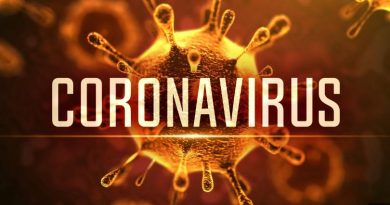Rare multisystem inflammatory syndrome appears in some teenagers after COVID-19 vaccination: study
NEW York can now listen to Fox News articles!
Young people between the ages of 12-20 have reported several cases of a multi-system inflammatory syndrome, otherwise known as MIS-C, where the immune system goes on overdrive after being vaccinated for COVID-19, according to a recent Lancet report.
The report noted MIS-C is a rare condition that can happen two to six weeks after COVID-19 infection with patients complaining of fever and showing signs and symptoms of multi-organ involvement with systemic inflammation.
“Patients with MIS-C usually present with persistent fever, abdominal pain, vomiting, diarrhea, skin rash, mucocutaneous lesions and, in severe cases, with hypotension and shock,” the Centers for Disease Control and Prevention (CDC) said on their website.

Doctor putting adhesive bandage to a teenage boy after Covid-19 vaccine injection.
The agency added the illness “may begin weeks after a child is infected with SARS-CoV-2. The child may have been infected from an asymptomatic contact and, in some cases, the child and their caregivers may not even know they had been infected.”
First recognized in April 2020, 5973 cases were reported to the CDC between May 2020 to November 2021, with the study’s authors hypothesizing the illness develops because of a hyperactive immune response to COVID-19 infection in susceptible patients who have a genetic predisposition for the syndrome.
EXPLAINING WAR TO KIDS AS RUSSIA INVADES UKRAINE: WHAT TO SAY AND HOW TO SAY IT
But the study investigated if the syndrome also occurred after COVID-19 vaccination.

A team of researchers from Mount Sinai claimed to have discovered an “important clue” behind a rare, potentially serious coronavirus-related inflammatory illness in children, called multisystem inflammatory syndrome in children or MIS-C.
(iStock)
The study analyzed the CDC’s Vaccine Adverse Event Reporting System for potential cases of MIS-C after COVID-19 vaccination from Dec. 14, 2020, to Aug. 31, 2021, in individuals aged 12─20 years, identifying 21 young people, with a mean age of 16 years old, who met the CDC’s definition of the inflammatory condition.
The researchers noted all of these patients were hospitalized, 57% were admitted directly to the intensive care unit, with 71% with laboratory evidence of past or recent COVID-19 infection, but all were discharged home.
Even though six young people in the study didn’t have evidence of a prior COVID-19 infection, the researchers hypothesized because the lab assays have limited sensitivity for asymptomatic infections, the young participants might have been infected with COVID-19 even though they tested negative, so “vaccination might be coincidental to the subsequent MIS-C illness.”
Over 21 million individuals ages 12-20 years old received one or more doses of COVID-19 vaccine as of August 31, 2021, so the overall reporting rate for MIS-C after vaccination is 1 case per million people compared to a rate of 0.3 cases per million vaccinated individuals among those without prior laboratory evidence of COVID-19, per the study.
These rates are “substantially lower than the previously published incidence of MIS-C among unvaccinated individuals in this age group in the USA who had SARS-CoV-2 infection (approximately 200 cases per million SARS-CoV-2 infections),” the researchers said.
CDC: PEDIATRIC ER VISITS SKYROCKET FOR INJURIES AND EATING DISORDERS DURING THE PANDEMIC
Although the report seems concerning, most of the cases in the study were not considered fully vaccinated, so unvaccinated young people are still more likely to develop MIS-C than those who are fully vaccinated, according to a Today report.
“At first glance, it seems to cause us to step back and say, ‘Wait a minute, are these vaccines contributing to MIS-C?’” said Dr. Jim Versalovic, pathologist-in-chief and COVID-19 command center co-leader at Texas Children’s Hospital.
“It does the opposite for me. It emphasizes the point of vaccination.”
The study found 11 young people developed MIS-C after their first vaccination dose with eight days as median time from first being vaccinated to hospitalization compared to 10 individuals who developed the systemic illness after receiving their second dose and five days as the median time from first being vaccinated to getting hospitalized.

An expert says amputations relating to MIS-C are an “incredibly rare and unfortunate consequence.”
(Photo courtesy of Mary Free Bed Rehabilitation Hospital)
The study has limitations including underestimating rates of all MIS-C cases among those who received the COVID-19 vaccine because the data was analyzed by passive reporting systems and because the researchers relied only on reports with final diagnoses that noted MIS-C since there is no definitive test to diagnose the condition.
Experts urge parents to get their teenagers vaccinated as only 57% of 12- to 17-year-olds are fully vaccinated, according to the CDC.
The researchers concluded the contribution of the COVID-19 vaccine to MIS-C is unknown, so they encouraged health care providers to rule out other causes when evaluating individuals with a clinical presentation consistent with the systemic syndrome.
“Continued surveillance for MIS-C illness after COVID-19 vaccination is warranted, especially as pediatric COVID-19 vaccination is authorized and recommended for younger children who comprise the highest proportion of MIS-C cases after SARS-Cov-2 infection,” the researchers said.
CLICK HERE TO GET THE FOX NEWS APP
Click here for more information for parents about the syndrome.

